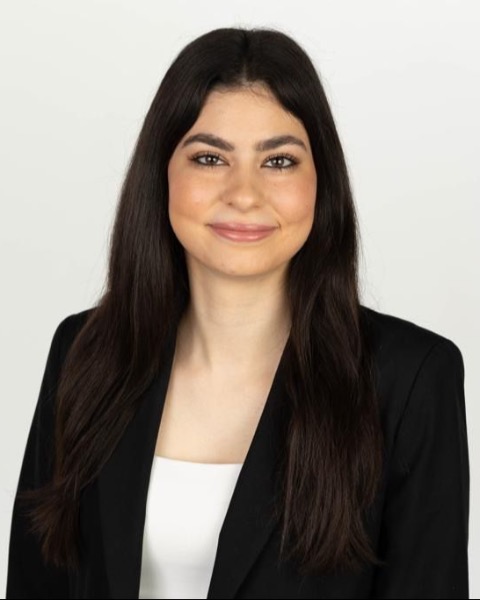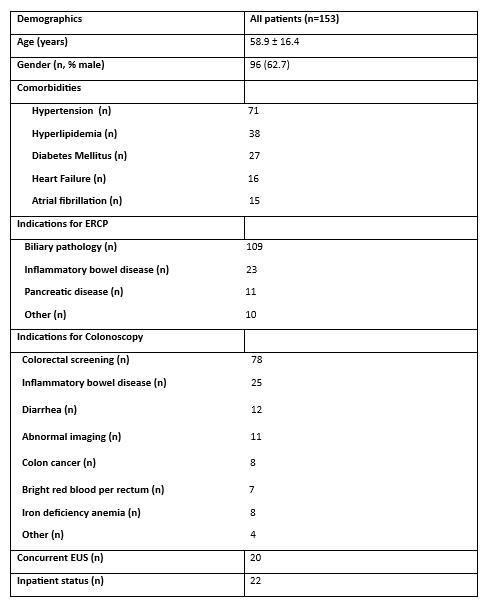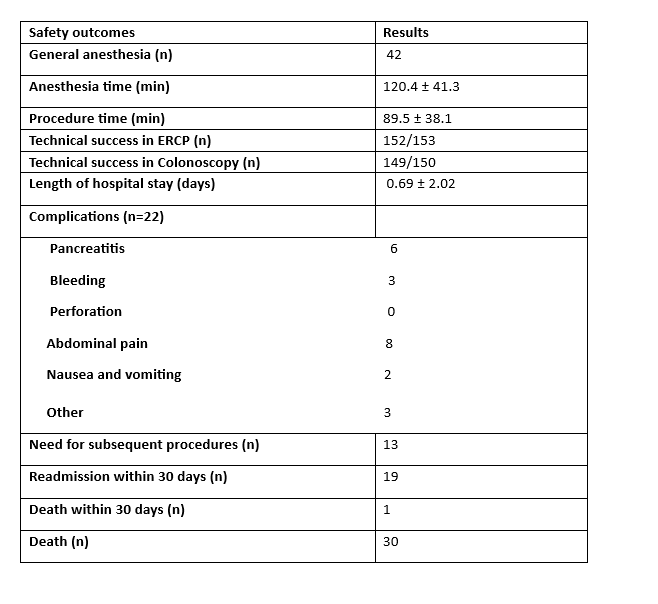Monday Poster Session
Category: Biliary/Pancreas
P2212 - Safety Outcomes of Same-Day Endoscopic Retrograde Cholangiopancreatography (ERCP) and Colonoscopy: A Retrospective Cohort Study
Monday, October 27, 2025
10:30 AM - 4:00 PM PDT
Location: Exhibit Hall

Reem Matar, MBBS
Mayo Clinic
Rochester, MN
Presenting Author(s)
Reem Hekmat. Matar, MBBS, MPH, Sapheya Elhadi, BS, Bret Petersen, MD, John Martin, MD, Ryan Law, DO, Samuel Han, MD, Eric J.. Vargas, MD, MS, Vinay Chandrasekhara, MD, Andrew Storm, MD
Mayo Clinic, Rochester, MN
Introduction: Same-day ERCP and colonoscopy are occasionally performed to minimize patient burden and improve procedural efficiency. However, concerns remain regarding cumulative sedation risks and post-procedural complications. This study aimed to evaluate the safety outcomes associated with same-day ERCP and colonoscopy.
Methods: We conducted a retrospective cohort study of adult patients who underwent same-day ERCP and colonoscopy at a tertiary care center between 2018 and 2025. Data collected included demographics, procedural indications, type of sedation, technical success, and complications occurring immediately or within 30 days post-procedure. Statistical analysis was performed using JMP software (Version 15.0.0 (2019), SAS Institute Inc., Cary, NC).
Results: A total of 153 patients were included (mean age 58.9 ± 16.4 years; range 21–98; 62.7% male) (Table 1). ERCP indications included biliary pathology (n=109), malignancy (n=23), and pancreatic disease (n=11). Colonoscopy indications were colorectal cancer screening (n=78) and inflammatory bowel disease (n=25). Technical success was achieved in 152/153 ERCPs and 149/150 colonoscopies. Twenty-two patients (14.4%) were inpatient at the time of the procedures. The average hospital length of stay was 0.69 ± 2.02 days.
Within 30 days, 19 patients (12.4%) were readmitted, and 22 (14.4%) experienced complications. The most common complications were abdominal pain (n=8), post-ERCP pancreatitis (n=6), and bleeding (n=3). Less frequent complications included nausea/vomiting (n=2), spontaneous bacterial peritonitis (n=1), cholangitis (n=1), and infection (n=1). Mean procedure duration was 89.5 ± 38.1 minutes; mean anesthesia time was 120.4 ± 41.3 minutes. No procedure-related mortalities occurred.
Discussion: Same-day ERCP and colonoscopy were found to be technically successful, safe, and well-tolerated in a diverse and medically complicated patient population. These findings support the feasibility of same-day scheduling in appropriately selected patients, potentially enhancing procedural unit efficiency and reducing episodes of anesthesia when compared to performing these procedures separately, without increasing adverse event risk.

Figure: Table 1. Demographic characteristics of included patients

Figure: Table 2. Safety outcomes of included patients
Disclosures:
Reem Matar indicated no relevant financial relationships.
Sapheya Elhadi indicated no relevant financial relationships.
Bret Petersen: Olympus America – Consultant. Pentax – Consultant.
John Martin indicated no relevant financial relationships.
Ryan Law: Boston Scientific – Consultant, Grant/Research Support. Neptune Medical – Data safety monitoring board. Olympus America – Consultant, Grant/Research Support. UpToDate – Royalties.
Samuel Han: Boston Scientific – Consultant.
Eric Vargas indicated no relevant financial relationships.
Vinay Chandrasekhara indicated no relevant financial relationships.
Andrew Storm: Ambu – Consultant. Apollo Endosurgery – Consultant, Grant/Research Support. Boston Scientific – Consultant, Grant/Research Support. Cook – Consultant. Endogenex – Grant/Research Support. Endo-Tagss – Grant/Research Support. Enterasense – Grant/Research Support. Envision Endoscopy – Grant/Research Support. Intuitive – Consultant. Medtronic – Consultant. MGI Medical – Grant/Research Support. Microtech – Consultant. Olympus – Consultant. OnePass – Grant/Research Support. SofTac – Grant/Research Support. Sotelix – Consultant. Steris – Consultant.
Reem Hekmat. Matar, MBBS, MPH, Sapheya Elhadi, BS, Bret Petersen, MD, John Martin, MD, Ryan Law, DO, Samuel Han, MD, Eric J.. Vargas, MD, MS, Vinay Chandrasekhara, MD, Andrew Storm, MD. P2212 - Safety Outcomes of Same-Day Endoscopic Retrograde Cholangiopancreatography (ERCP) and Colonoscopy: A Retrospective Cohort Study, ACG 2025 Annual Scientific Meeting Abstracts. Phoenix, AZ: American College of Gastroenterology.
Mayo Clinic, Rochester, MN
Introduction: Same-day ERCP and colonoscopy are occasionally performed to minimize patient burden and improve procedural efficiency. However, concerns remain regarding cumulative sedation risks and post-procedural complications. This study aimed to evaluate the safety outcomes associated with same-day ERCP and colonoscopy.
Methods: We conducted a retrospective cohort study of adult patients who underwent same-day ERCP and colonoscopy at a tertiary care center between 2018 and 2025. Data collected included demographics, procedural indications, type of sedation, technical success, and complications occurring immediately or within 30 days post-procedure. Statistical analysis was performed using JMP software (Version 15.0.0 (2019), SAS Institute Inc., Cary, NC).
Results: A total of 153 patients were included (mean age 58.9 ± 16.4 years; range 21–98; 62.7% male) (Table 1). ERCP indications included biliary pathology (n=109), malignancy (n=23), and pancreatic disease (n=11). Colonoscopy indications were colorectal cancer screening (n=78) and inflammatory bowel disease (n=25). Technical success was achieved in 152/153 ERCPs and 149/150 colonoscopies. Twenty-two patients (14.4%) were inpatient at the time of the procedures. The average hospital length of stay was 0.69 ± 2.02 days.
Within 30 days, 19 patients (12.4%) were readmitted, and 22 (14.4%) experienced complications. The most common complications were abdominal pain (n=8), post-ERCP pancreatitis (n=6), and bleeding (n=3). Less frequent complications included nausea/vomiting (n=2), spontaneous bacterial peritonitis (n=1), cholangitis (n=1), and infection (n=1). Mean procedure duration was 89.5 ± 38.1 minutes; mean anesthesia time was 120.4 ± 41.3 minutes. No procedure-related mortalities occurred.
Discussion: Same-day ERCP and colonoscopy were found to be technically successful, safe, and well-tolerated in a diverse and medically complicated patient population. These findings support the feasibility of same-day scheduling in appropriately selected patients, potentially enhancing procedural unit efficiency and reducing episodes of anesthesia when compared to performing these procedures separately, without increasing adverse event risk.

Figure: Table 1. Demographic characteristics of included patients

Figure: Table 2. Safety outcomes of included patients
Disclosures:
Reem Matar indicated no relevant financial relationships.
Sapheya Elhadi indicated no relevant financial relationships.
Bret Petersen: Olympus America – Consultant. Pentax – Consultant.
John Martin indicated no relevant financial relationships.
Ryan Law: Boston Scientific – Consultant, Grant/Research Support. Neptune Medical – Data safety monitoring board. Olympus America – Consultant, Grant/Research Support. UpToDate – Royalties.
Samuel Han: Boston Scientific – Consultant.
Eric Vargas indicated no relevant financial relationships.
Vinay Chandrasekhara indicated no relevant financial relationships.
Andrew Storm: Ambu – Consultant. Apollo Endosurgery – Consultant, Grant/Research Support. Boston Scientific – Consultant, Grant/Research Support. Cook – Consultant. Endogenex – Grant/Research Support. Endo-Tagss – Grant/Research Support. Enterasense – Grant/Research Support. Envision Endoscopy – Grant/Research Support. Intuitive – Consultant. Medtronic – Consultant. MGI Medical – Grant/Research Support. Microtech – Consultant. Olympus – Consultant. OnePass – Grant/Research Support. SofTac – Grant/Research Support. Sotelix – Consultant. Steris – Consultant.
Reem Hekmat. Matar, MBBS, MPH, Sapheya Elhadi, BS, Bret Petersen, MD, John Martin, MD, Ryan Law, DO, Samuel Han, MD, Eric J.. Vargas, MD, MS, Vinay Chandrasekhara, MD, Andrew Storm, MD. P2212 - Safety Outcomes of Same-Day Endoscopic Retrograde Cholangiopancreatography (ERCP) and Colonoscopy: A Retrospective Cohort Study, ACG 2025 Annual Scientific Meeting Abstracts. Phoenix, AZ: American College of Gastroenterology.

